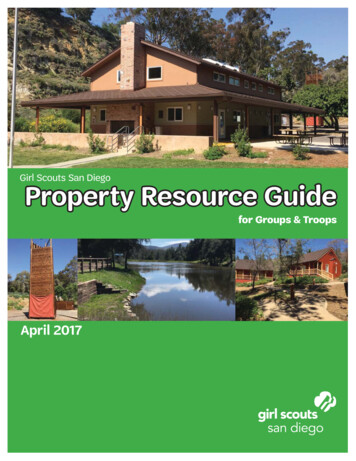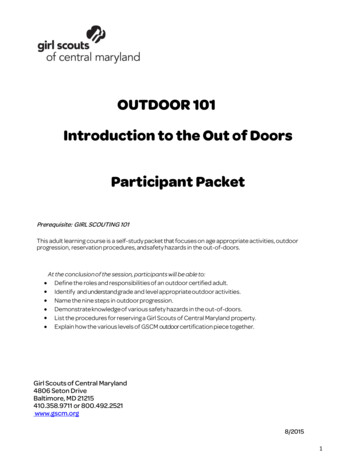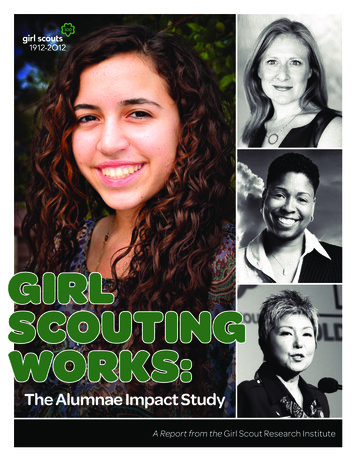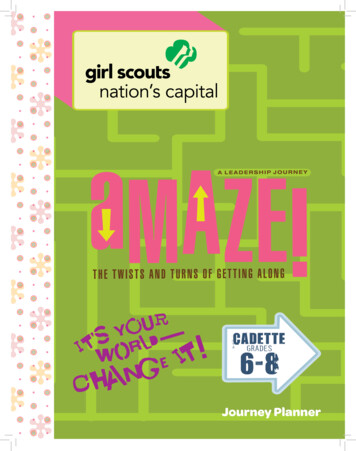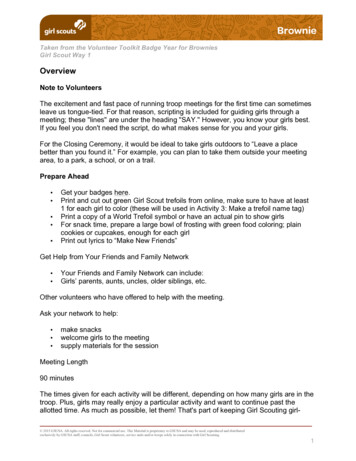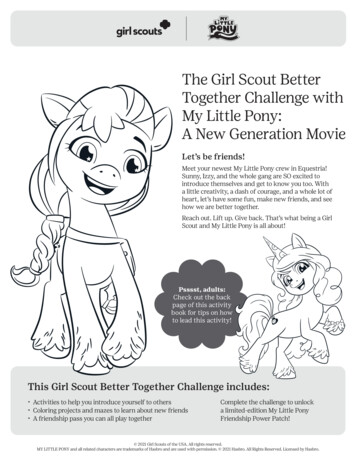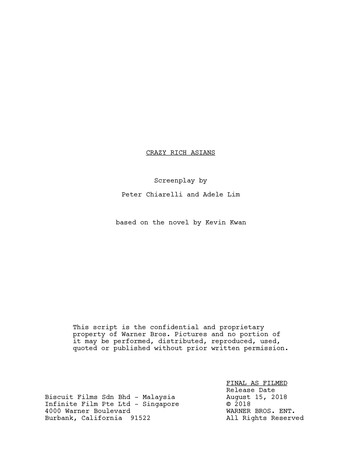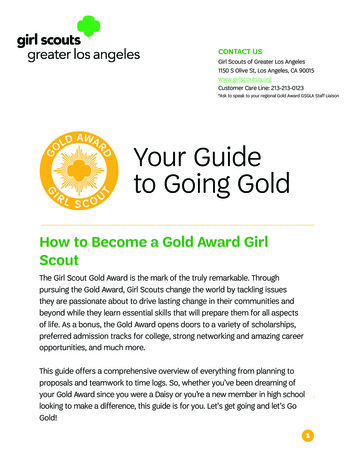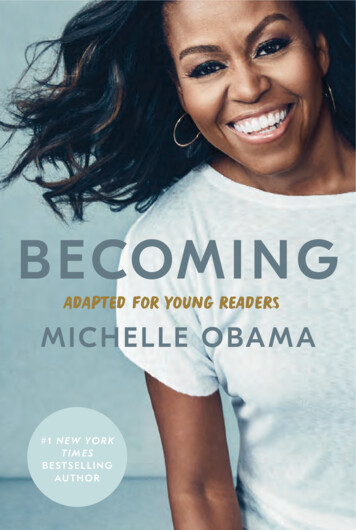
Transcription
BECOMI N GMI C H E LLE OBA M A# 1 N E W YO R KTIMESBESTSELLINGAU T H O R
WHO ARE YOU,AND WHAT DO YOU WANTTO BECOME?Hey, Girl Scouts:You’re invited to participate in the all-new Becoming Me program!Inspired by Michelle Obama’s book Becoming: Adapted forYoung Readers, you will explore the truth in your own story andthe power of your voice, while hanging out with friends. Thisprogram will take between six and eight sessions to completeand can be done with your troop or your council.With unique experiences created for Daisies, Brownies, Juniors,Cadettes, Seniors, Ambassadors, and Multi-level troops, you will: Explore your own “unseen” history Strengthen your support system Find your unique voice Learn to “swerve” Give back through public serviceGo to girlscouts.org/becomingme to access the program andfind out more.
Text copyright 2021 by Michelle ObamaAll rights reserved. Published in the United States byDelacorte Press, an imprint of Random House Children’s Books,a division of Penguin Random House LLC, New York.This work is based on Becoming, copyright 2018 by Michelle Obama.Published in hardcover by Crown, an imprint of Random House PublishingGroup, a division of Penguin Random House LLC, New York, in 2018.Delacorte Press is a registered trademarkand the colophon is a trademark of Penguin Random House LLC.Photograph credits appear on page 405.Visit us on the Web! rhcbooks.comEducators and librarians, for a variety of teaching tools,visit us at RHTeachersLibrarians.comLibrary of Congress Cataloging-in-Publication Data is available upon request.ISBN 978-0-593-30374-0 (trade) — ISBN 978-0-593-30375-7 (lib. bdg.) —ISBN 978-0-593-30376-4 (ebook)The text of this book is set in 11.5-point Minion Pro.Interior design by Andrea LauJacket design by Christopher BrandJacket photograph by Miller Mobleyprinted in the united states of america10 9 8 7 6 5 4 3 2 1First EditionRandom House Children’s Books supportsthe First Amendment and celebrates the right to read.Penguin Random House LLC supports copyright. Copyright fuels creativity,encourages diverse voices, promotes free speech, and creates a vibrant culture.Thank you for buying an authorized edition of this book and for complying withcopyright laws by not reproducing, scanning, or distributing any part in anyform without permission. You are supporting writers and allowingPenguin Random House to publish books for every reader.FREE SAMPLE COPY—NOT FOR RESALE
BECOMINGMICHELLEOBAMAD E L ACO RT E P R E S S
a note to readersWHEN I BEGAN THE PROCESS OF WRITING THIS BOOK, Iwasn’t sure what shape it would ultimately take, let alone what the titlemight be. One thing I did know was that I wanted to be honest—andthis edition for young readers is no different. Growing up on the SouthSide of Chicago in the 1960s and ’70s, my parents, Fraser and MarianRobinson, always kept it straight with me and my brother, Craig. Theynever sugarcoated hard truths or presented their reality as anythingother than what it was—because they knew we could handle it. I wantto give you all that same respect.So my promise to you is to give you my story in all its messy glory—from the time I struggled on a question in front of my kindergartenclass, to my first kiss and the insecurities I felt growing up, to the chaosof a campaign trail and the strange experience of shaking hands withthe Queen of England.But I hope you don’t get too swept up in the glitz of the WhiteHouse, because the most meaningful parts of my story aren’t the ballgowns or state dinners. Instead, they are the little things: the waymy grandfather smiled when he put his favorite album on the record4 ix
player, the smell of our house when my mom cleaned it each spring,the sound of an ice scraper on a car window in the middle of a Chicagowinter.During the writing process, I realized that there is no memorytoo small. Every last bit of our story has meaning. Some memoriescan bring a twinge of pain, particularly those that happen whenwe are young. I can still feel the embarrassment when I failed infront of my classmates at a young age. I can still feel the knot in mystomach after someone doubted me. And I still feel the pain andthe emptiness that came with losing those closest to me. At somepoint, we all experience the kind of hurt that we can’t fix on ourown.But those tender spots—the ones that we try the hardest to keephidden—are often the parts of ourselves that are most worth sharing. Feelings like discomfort and struggle are signs that we’re doingthe hard work of discovering the greatest truths about ourselves.And when I look back at my own life, I see that it’s only throughthose moments of great difficulty that I was able to find the strengthto make a change or search more purposefully for who I wantedto be.These kinds of things aren’t usually what we feel comfortable sharing with one another. We’re usually most concerned with what I liketo call our statistics—our test scores, our exploits on the sports field,the kind of jeans our family can afford to buy. But truly, what’s mostimportant is our story—our whole story, including those momentswhen we feel a little vulnerable. So often, it’s in sharing those parts ofour stories that we see the beauty not only in our own journey, but insomeone else’s.So I hope that as you’re reading my story, you’ll also think aboutyour own—because it’s the most beautiful gift you’ll ever have. Thebumps and bruises, the joys and triumphs and bursts of laughter—theyx5
all combine to make you who you are. And who you are is not somestatic, unchanging thing. It will change every day and every year, andnone of us know what shape our lives will ultimately take. That’s whatbecoming is all about. And just like you, I still have a whole lot ofbecoming left to do, too.6 xi
prefaceMarch 2017WHEN I WAS A KID, MY DREAMS WERE SIMPLE. I WANTEDa dog. I wanted a house that had stairs in it—two floors for one family.For some reason, I wanted a four-door station wagon instead of thetwo-door Buick that was my dad’s pride and joy. I used to tell peoplethat when I grew up, I was going to be a pediatrician. Why? BecauseI loved being around little kids and I quickly learned that it was apleasing answer for adults to hear. Oh, a doctor! What a good choice!In those days, I wore pigtails and bossed my older brother aroundand managed, always and no matter what, to get As at school. I wasambitious, though I didn’t know exactly what I was shooting for. NowI think it’s one of the most useless questions an adult can ask a child—What do you want to be when you grow up? As if at some point youbecome something and that’s the end.So far in my life, I’ve been a lawyer. I’ve been a vice president at ahospital and the director of a nonprofit that helps young people buildmeaningful careers. I’ve been a working-class Black student at a fancymostly white college. I’ve been the only woman, the only African7xiii
American, in all sorts of rooms. I’ve been a bride, a stressed-out newmom, a daughter torn up by grief. And until recently, I was the FirstLady of the United States of America. Being First Lady challenged meand humbled me, lifted me up and shrank me down, sometimes allat once. I’m just beginning to process what took place over these lastyears—from the moment in 2006 when my husband first started talking about running for president to where we are now. It’s been quitea ride.When you’re First Lady, America shows itself to you in its extremes.I’ve been to fund-raisers in private homes that look more like art museums, houses where people own bathtubs made from gemstones. I’vevisited families who lost everything in Hurricane Katrina and weretearful and grateful just to have a working refrigerator and stove. I’veencountered people I find to be shallow and false and others—teachersand military spouses and so many more—whose spirits are so deepand strong it’s astonishing. And I’ve met kids—lots of them, all overthe world—who crack me up and fill me with hope and who blessedlymanage to forget about my title once we start rooting around in thedirt of a garden.I’ve been held up as the most powerful woman in the world andtaken down as an “angry Black woman.” I’ve wanted to ask those people what they didn’t like about me—was it that I was “angry,” or that Iwas Black, or that I was a woman? I’ve smiled for photos with peoplewho call my husband horrible names on national television, but stillwant a framed keepsake. Some people on the internet have questionedeverything about me, right down to whether I’m a woman or a man.A U.S. congressman has made fun of my butt. I’ve been hurt. I’ve beenfurious. But mostly, I’ve tried to laugh this stuff off.There’s a lot I still don’t know about America, about life, about whatthe future might bring. But I do know myself. My dad, Fraser, taughtme to work hard, laugh often, and keep my word. My mom, Marian,showed me how to think for myself and to use my voice. Together, inxiv8
our cramped apartment on the South Side of Chicago, they helped mesee the value in our story, in my story, in the larger story of our country. Even when it’s not pretty or perfect. Even when it’s more real thanyou want it to be. Your story is what you have, what you will alwayshave. It is something to own.For eight years, I lived in the White House, a place with more stairsthan I can count—plus elevators, a bowling alley, and an in-house florist. I slept in a bed that was made up with fancy linens. Our mealswere cooked by a team of world-class chefs and delivered by professionals more highly trained than those at any five-star restaurant orhotel. Secret Service agents, with their earpieces and guns and serious expressions, stood outside our doors, doing their best to stay outof our family’s private life. We got used to it, eventually, sort of—thestrange grandeur of our new home and also the constant, quiet presence of others.The White House is where our two girls played ball in the hallwaysand climbed trees on the South Lawn. It’s where my husband, BarackObama, sat up late at night, reading briefings and drafts of speechesin the Treaty Room, and where Sunny, one of our dogs, sometimespooped on the rug. I could stand on the Truman Balcony and watchthe tourists posing with their selfie sticks and peering through theiron fence, trying to guess at what went on inside. There were dayswhen I felt suffocated by the fact that our windows had to be kept shutfor security, that I couldn’t get some fresh air without causing a fuss.There were other times when I’d be awestruck by the white magnolias blooming outside, the everyday bustle of government business, themajesty of a military welcome. There were days, weeks, and monthswhen I hated politics. And there were moments when the beauty ofthis country and its people so overwhelmed me that I couldn’t speak.Then it was over. Even if you see it coming, even as your final weeksare filled with emotional good-byes, the day itself is still a blur. A handgoes on a Bible; an oath gets repeated. One president’s furniture gets9xv
carried out while another’s comes in. Closets are emptied and refilledin the span of a few hours. Just like that, there are new heads on newpillows—new personalities, new dreams. And when it ends, when youwalk out the door that last time from the world’s most famous address,you’re left in many ways to find yourself again.So let me start here, with a small thing that happened not long ago.I was at home in the redbrick house that my family recently movedinto. Our new house sits about two miles from our old house, on aquiet neighborhood street. We’re still settling in. In the family room,our furniture is arranged the same way it was in the White House.We’ve got mementos around the house that remind us it was all real—photos of our family time at Camp David, handmade pots given to meby Native American students, a book signed by Nelson Mandela. Whatwas strange about this night was that everyone was gone. Barack wastraveling. My younger daughter, Sasha, was out with friends. My olderdaughter, Malia, was living and working in New York before going tocollege. It was just me, our two dogs, and a silent, empty house like Ihaven’t known in eight years.And I was hungry. I walked down the stairs from our bedroom withthe dogs following on my heels. In the kitchen, I opened the fridge. Ifound a loaf of bread, took out two pieces, and laid them in the toasteroven. I opened a cabinet and got out a plate. I know it’s a weird thingto say, but to take a plate from a shelf in the kitchen without anyonefirst insisting that they get it for me, to stand by myself watching breadturn brown in the toaster, feels as close to a return to my old life as I’vecome. Or maybe it’s my new life just beginning to announce itself.In the end, I didn’t just make toast; I made cheese toast, moving myslices of bread to the microwave and melting a fat mess of gooey cheddar between them. I then carried my plate outside to the backyard. Ididn’t have to tell anyone I was going. I just went. I was in bare feet,wearing a pair of shorts. The chill of winter had finally lifted. Theair smelled like spring. I sat on the steps of our veranda, feeling thexvi10
warmth of the day’s sun still caught in the slate beneath my feet. A dogstarted barking somewhere in the distance, and my own dogs pausedto listen, seeming momentarily confused. It occurred to me that it wasa jarring sound for them, given that we didn’t have neighbors, let aloneneighbor dogs, at the White House. For them, all this was new. As thedogs loped off to explore the perimeter of the yard, I ate my toast inthe dark, feeling alone in the best possible way. I wasn’t thinking aboutthe guards with guns sitting less than a hundred yards away at thecustom-built command post inside our garage, or the fact that I stillcan’t walk down a street without security. I wasn’t thinking about thenew president or for that matter the old president, either.I was thinking instead about how in a few minutes I would go backinside my house, wash my plate in the sink, and head up to bed, maybeopening a window so I could feel the spring air—how glorious thatwould be. I was thinking, too, that the stillness was affording me afirst real opportunity to think about so many things. As First Lady,I’d get to the end of a busy week and need to be reminded how it hadstarted. But time is beginning to feel different. My girls, who arrivedat the White House with their Polly Pocket dolls, a blanket namedBlankie, and a stuffed tiger named Tiger, are now teenagers, youngwomen with plans and voices of their own. My husband is makinghis own adjustments to life after the White House, catching his ownbreath. And here I am, in this new place, with a lot I want to say.11xvii
4AT SCHOOL, WE WERE GIVEN AN HOUR-LONG BREAKfor lunch each day. I usually marched home with four or five othergirls, all of us talking nonstop, ready to play games on the kitchen floorand watch TV while my mom handed out sandwiches. This began ahabit that has sustained me for life, keeping a close and high-spiritedgroup of girlfriends whose wisdom I can rely on. In my lunch group,we talked about whatever had gone on that morning at school, anydifferences we had with teachers, any assignments we thought wereuseless. We loved the Jackson 5 and weren’t sure how we felt aboutthe Osmonds. The Watergate scandal had happened, but none of usunderstood it. It seemed like a lot of old guys talking into microphonesin Washington, D.C., which to us was just a faraway city filled with alot of white buildings and white men.My mom was happy to serve us. It gave her an easy window intoour world. As my friends and I ate and gossiped, she often stood byquietly, doing some household chore, not hiding the fact that she waslistening to every word. In my family, with four of us packed into asmall apartment, we’d never had any privacy anyway. It only mattered1243
sometimes. Craig, who was suddenly interested in girls, had startedtaking his phone calls in the bathroom.As Chicago schools went, Bryn Mawr fell somewhere betweenbeing a bad school and a good school. The student population onlygrew Blacker and poorer with each year. There was, for a time, a citywide movement to bus kids to new schools, but Bryn Mawr parentshad fought it off, arguing that the money was better spent improving the school itself. As a kid, I had no opinion on whether the facilities were run-down or whether it mattered that there were hardly anywhite kids left. The school ran from kindergarten all the way througheighth grade, which meant that by the time I’d reached the uppergrades, I knew every light switch, every chalkboard and cracked patchof hallway. I knew nearly every teacher and most of the kids. For me,Bryn Mawr was practically an extension of home.As I was entering seventh grade, the Chicago Defender, a weeklynewspaper that was popular with African American readers, ran amean-spirited opinion piece that claimed Bryn Mawr had gone frombeing one of the city’s best public schools to a “run-down slum” governed by a “ghetto mentality.” Our school principal, Dr. Lavizzo, defended his community of parents and students, calling the newspaperpiece “an outrageous lie, which seems designed to incite only feelingsof failure and flight.”Dr. Lavizzo was a round, cheery man who had an Afro that puffedout on either side of his bald spot. He understood precisely what hewas up against. Failure is a feeling long before it becomes an actualresult. It’s a feeling of vulnerability mixed in with self-doubt and madeeven stronger by fear. Those “feelings of failure” he mentioned wereeverywhere already in my neighborhood, in the form of parents whocouldn’t get ahead financially, of kids who were starting to suspectthat their lives would be no different, of families who watched theirbetter-off neighbors leave for the suburbs or transfer their children toCatholic schools. Real estate agents made things worse by whispering4413
to homeowners that they should sell before it was too late. The comments pushed people to feel that failure was coming, that it had already half arrived. You could get caught up in the ruin or you couldescape it. They used the word everyone was most afraid of—“ghetto”—dropping it like a lit match.My mom bought into none of this. She’d lived in South Shore forten years already and would end up staying another forty. She didn’tbuy into fearmongering or pie-in-the-sky idealism. She was a straightdown-the-line realist, controlling what she could.At Bryn Mawr, she became one of the most active members of thePTA, helping raise money for new classroom equipment and throwing appreciation dinners for the teachers. She also helped convince theschool to create a special multigrade classroom for higher-performingstudents. The class was Dr. Lavizzo’s idea. It brought the brighter kidstogether so they could learn at a faster pace.The idea was controversial, as all “gifted and talented” programsare. But for my last three years at Bryn Mawr, I benefited. I joineda group of about twenty students from different grades, set off in aself-contained classroom apart from the rest of the school. We hadour own recess, lunch, music, and gym schedules. We were also givenspecial opportunities, including weekly trips to a community collegeto attend an advanced writing workshop or dissect a rat in the biologylab. Back in the classroom, we did a lot of independent work, settingour own goals and moving at whatever speed best suited us.We were given dedicated teachers, first Mr. Martinez and thenMr. Bennett, both gentle and friendly African American men whocared a lot about what their students had to say. We could tell that theschool had invested in us, which made us all try harder and feel betterabout ourselves. Being allowed to learn independently made me evenmore competitive. I tore through the lessons, quietly aware of where Istood among my peers as we moved from long division to pre-algebra,from writing single paragraphs to turning in full research papers. For1445
me, it was like a game. And as with any game, like most any kid, I washappiest when I was ahead.I TOLD MY mom everything that happened at school. I’d update herin a rush as I walked through the door in the afternoon, slinging mybook bag on the floor and hunting for a snack. I realize I don’t knowexactly what my mom did during the hours we were at school, mainlybecause I never asked. I don’t know what she thought about, how shefelt about being a traditional homemaker as opposed to working a different job. I only knew that when I showed up at home, there’d be foodin the fridge, not just for me, but for my friends. I knew that when myclass was going on a trip, my mom would almost always volunteer tochaperone, arriving in a nice dress and dark lipstick to ride the buswith us to the community college or the zoo.In our house, we lived on a budget but didn’t often discuss its limits. My mom did her own nails, dyed her own hair (one time accidentally turning it green), and got new clothes only when my dad boughtthem for her as a birthday gift. She’d never be rich, but she was always crafty. When we were young, she magically turned old socks intopuppets that looked exactly like the Muppets. She sewed a lot of myclothes, at least until middle school, when I insisted she stop.Every so often, she’d change the layout of our living room, putting a new slipcover on the sofa, swapping out the photos and framedprints that hung on our walls. Every year, when the weather turnedwarm, she did a spring cleaning—vacuuming furniture, launderingcurtains, and removing every storm window so she could Windexthe glass and wipe down the sills before replacing them with screensto allow the spring air into our tiny, stuffy apartment. She’d thenoften go downstairs to Robbie and Terry’s, particularly as they gotolder and less able, to clean for them as well. It’s because of my mom4615
that whenever I catch the scent of Pine-Sol, I automatically feel betterabout life.At Christmastime, she got especially creative. One year, she figured out how to cover our radiator with cardboard printed to look likered bricks, so that we’d have our own chimney and fireplace. She thenasked my dad—the family’s resident artist—to paint orange flames onpieces of very thin paper, which, when backlit with a lightbulb, madefor a half-convincing fire. On New Year’s Eve, as a matter of tradition,she’d buy a special food basket, the kind that came filled with blocksof cheese, smoked oysters in a tin, and different kinds of salami. She’dinvite my dad’s sister Francesca over to play board games. We’d ordera pizza for dinner and then snack our way elegantly through the rest ofthe evening, my mom passing around trays of pigs in a blanket, friedshrimp, and a special cheese spread baked on Ritz crackers. As midnight drew close, we’d each have a tiny glass of champagne.My mom was always calm. I had friends whose moms rode theirhighs and lows as if they were their own, and I knew plenty of otherkids whose parents were too overwhelmed by their own challengesto be much of a presence at all. My mom was simply even-keeled.She wasn’t quick to judge and she wasn’t quick to meddle. Instead,she monitored our moods and bore kindhearted witness to whateverproblems or triumphs a day might bring. When things were bad, shegave us only a small amount of pity. When we’d done something great,we received just enough praise to know she was happy with us, butnever so much that it became the reason we did what we did.Advice, when she offered it, tended to be practical. “You don’t haveto like your teacher,” she told me one day after I came home full ofcomplaints. “But that woman’s got the kind of math in her head thatyou need in yours. Focus on that and ignore the rest.”She loved us consistently, Craig and me, but we were not overmanaged. Her goal was to push us out into the world. “I’m not raising1647
babies,” she’d tell us. “I’m raising adults.” She and my dad offeredguidelines rather than rules. It meant that as teenagers we’d neverhave a curfew. Instead, they’d ask, “What’s a reasonable time for youto be home?” and then trust us to stick to our word.One day when Craig was in eighth grade, a girl he liked asked himto come by her house, letting him know that her parents wouldn’t behome and they’d be left alone. My brother had agonized over whetherto go or not—excited by the opportunity but knowing it was sneakyand dishonorable, the sort of behavior my parents would never approve of. This didn’t, however, stop him from telling my mom a halftruth, letting her know about the girl but saying they were going tomeet in the public park.Guilt-ridden before he’d even done it, guilt-ridden for even thinking about it, Craig finally confessed the whole home-alone scheme,expecting or maybe just hoping that my mom would blow a gasket andforbid him to go.But she didn’t. She wouldn’t. It wasn’t how she operated.She listened, but she made him responsible for his own choice.“Handle it how you think best,” she said, before turning back to thedishes in the sink or the pile of laundry she had to fold.It was another small push out into the world. I’m sure that in herheart my mom knew already that he’d make the right choice. Everymove she made, I realize now, was rooted in the quiet confidence thatshe’d raised us to be adults. Our decisions were on us. It was our life,not hers, and always would be.BY THE TIME I was fourteen, I thought of myself as half a grown-upanyway—maybe even as two-thirds of a grown-up. I’d gotten my period, which I announced immediately and with huge excitement toeveryone in the house, because that was just the kind of household we4817
had. I’d graduated from a training bra to one that looked slightly morewomanly, which also thrilled me. Instead of coming home for lunch,I now ate with my classmates in Mr. Bennett’s room at school. Insteadof dropping in at Southside’s house on Saturdays to listen to his jazzrecords and play with Rex, I rode my bike right past, headed east to thehouse on Oglesby Avenue where the Gore sisters lived.The Gore sisters were my best friends and also a little bit my idols.Diane was in my grade, and Pam a grade behind. Both were beautiful girls—Diane was fair-skinned, and Pam was darker—each witha kind of self-possessed grace that seemed to come naturally. Theirlittle sister, Gina, was a few years younger. Theirs was a home with fewmen. Their dad didn’t live there and was rarely discussed. There wasone much older brother who was not often present. Mrs. Gore was anupbeat, attractive woman who worked full-time. She had a makeuptable full of perfume bottles and face powder compacts, which seemedas exotic as jewels to me. I loved spending time at their house. Pam,Diane, and I talked endlessly about which boys we liked. We put on lipgloss and took turns trying on one another’s clothes, suddenly awarethat certain pairs of pants made our hips look curvier. Much of myenergy in those days was spent inside my own head, sitting alone inmy room listening to music, daydreaming about a slow dance with acute boy, or glancing out the window, hoping for a crush to ride hisbike down the block. So it was a blessing to have found some sisters toride through these years with together.Boys weren’t allowed inside the Gore house, but they buzzedaround it like flies. They rode their bikes back and forth on the sidewalk. They sat on the front stoop, hoping Diane or Pam might comeout to flirt. Everywhere I looked, bodies were changing. Boys fromschool were suddenly man-sized and awkward, their energy twitchyand their voices deep. Some of my girlfriends, meanwhile, looked likethey were eighteen, walking around in short-shorts and halter tops,1849
their expressions cool and confident as if they knew some secret, asif they now lived on a different plane, while the rest of us remaineduncertain, waiting for our call-up to the adult world.Like a lot of girls, I became aware of my body early, long before Ibegan to even look like a woman. I moved around the neighborhoodnow with more independence, less tied to my parents. I’d catch a citybus to go to late-afternoon dance classes at Mayfair Academy, where Iwas taking jazz and acrobatics. I ran errands for my mom sometimes.With the new freedoms came new challenges. I learned to keep mygaze fixed firmly ahead anytime I passed a group of men clustered ona street corner. I knew to ignore the catcalls when they came. I learnedwhich blocks in our neighborhood were thought to be more dangerous than others. I knew never to walk alone at night.At home, my parents gave in to the fact they were housing twogrowing teenagers, turning the back porch off our kitchen into a bedroom for Craig, who was now a sophomore in high school. The flimsypartition that Southside had built for us years earlier came down. Imoved into what had been my parents’ room, they moved into whathad been the kids’ room, and for the first time my brother and I hadactual space for ourselves. My new bedroom was dreamy, completewith a blue-and-white floral bed skirt and pillow shams, a crisp navyblue rug, and a white princess-style bed with a matching dresser andlamp. Each of us was given our own phone extension, too—my phonewas a light blue to match my new decor, while Craig’s was a manlyblack.I arranged my first real kiss over the phone. It was with a boynamed Ronnell. Ronnell didn’t go to my school or live in my neighborhood, but he sang in the Chicago Children’s Choir with my classmateChiaka. With Chiaka acting as the go-between, we somehow had decided we liked each other. Our phone calls were a little awkward, but Ididn’t care. I liked the feeling of being liked. I don’t remember which5019
one of us suggested that we meet outside my house one afternoon togive kissing a try, but I remember that we were both excited.There was nothing earth-shattering or especially inspiring aboutour
Hey, Girl Scouts: You’re invited to participate in the all-new Becoming Me program! Inspired by Michelle Obama’s book Becoming: Adapted for Young Readers, you will explore the truth in your own story and
